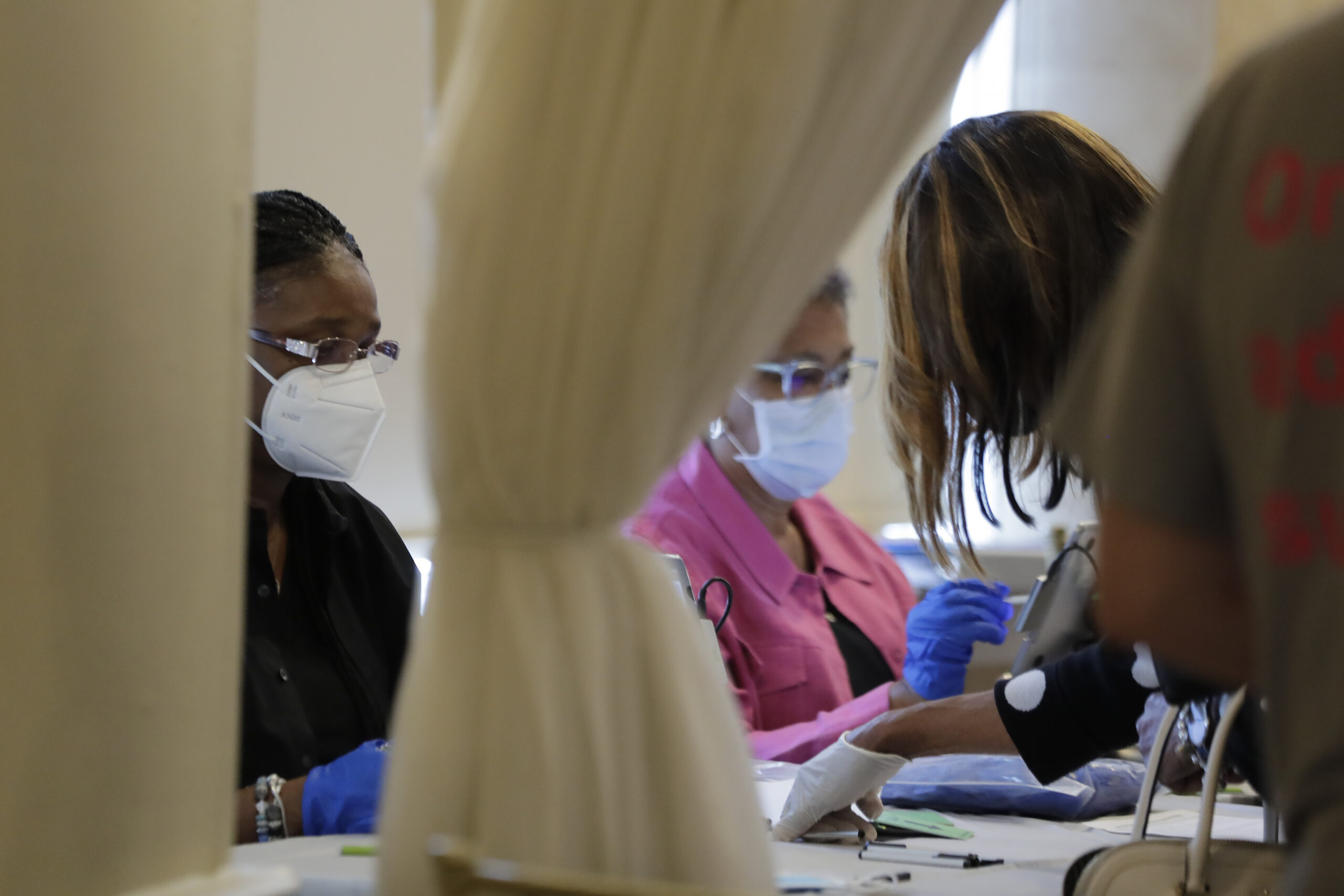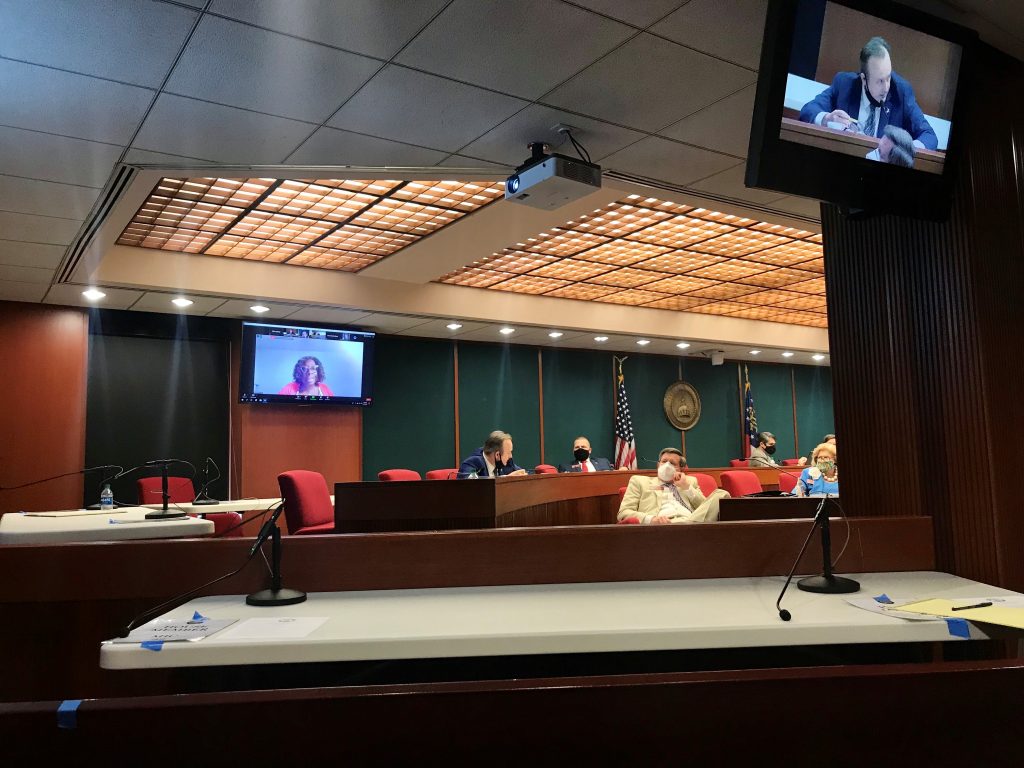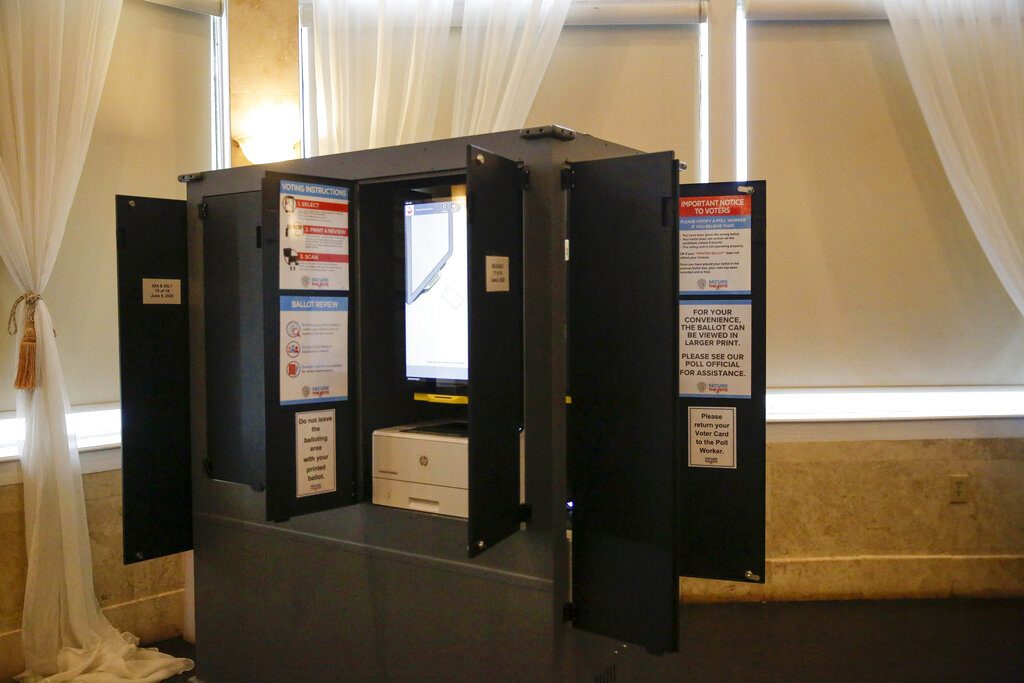Election Workers Detail The Good And Bad From Georgia’s Primaries

Poll workers help voters at the polling place at Park Tavern in Atlanta on June 9, 2020.
Brynn Anderson / Associated Press
Georgia’s primary elections earlier this month drew national attention, but not in a good way.
Images of long lines and stories of machines that weren’t working correctly were accompanied by accusatory fingers pointed at large counties such as Fulton and DeKalb and the secretary of state’s office.
The day after the elections, Georgia House Speaker David Ralston asked for the House Governmental Affairs committee to investigate what happened. On Thursday, inside a committee room, lawmakers listened for more than three hours as poll watchers, poll workers, poll managers, elections directors and election board members testified about their experiences.
Much of the testimony came via video chat with lawmakers spread out through the committee room to allow room for physical distancing.

Poll Worker Training
Fulton County placed an ad on social media the weekend before the June 9 election, seeking 250 additional poll workers.
“The county was still hiring poll workers the day before the election, and I was one of them,” said Jacoria Borders of Fulton County. “I was sent a link to the online training videos less than 16 hours before the election. I was given my assigned location at 7:30 p.m. the night before the election and I was told to arrive at 7 a.m., the same time that polls open on election day.”
Borders said she stayed up until 3 o’clock in the morning watching training videos, but that in some situations, they didn’t help troubleshooting issues with the state’s new voting machines. She was assigned to the William Walker Recreational Center.
“We had technical issues with ballot cards, some voters’ cards just didn’t work,” said Borders. “We had to reprogram them 3-4 times. I personally had two cases of this, which ended in one gentleman storming out and giving up on his basic right to vote.”
But elsewhere in Fulton County, veteran poll manager Venita Epps was able to retain a more experienced team of poll workers at Creel Park in College Park. Three new people were assigned to her polling place, but instead of being responsible for assisting voters with the new machines, they monitored lines, cleaned or collect cards and styluses.
“Because, although it may look simple to do, you’ve got to have a passion to serve,” said Epps. “And you have to strive for excellence through taking the time to train. So let that happen ahead of time.”
Several other poll managers emphasized that extended virtual and in-person training was essential to understanding the new voting machines.
New Voting Machines
Carol Beckham, a poll manager in Carroll County said they were able to work through technical challenges with the new voting machines, but it took some time.
“I missed having a step-by-step, laminated sheet that tells you how to set up each piece of equipment for opening,” said Beckham. “We used to have that and I could hand that to two of my workers and say ‘set up the BMD or set up the poll pads.’”

Beckham said a comprehensive technical guide was provided for the new machines, but it may be overwhelming for new poll workers under pressure to get machines working again.
She estimated that between eight and 12 times on election day, they would create a voter card only to have it say ‘card already used’. She says when a replacement card was given, it showed that the person had already voted. Later in the day, a voting machine stopped communicating with the printer next to it.
Suzy Boles, who has been a poll manager in Fulton for more than 20 years, said during the previous roll out of new voting machines in the early 2000s a technician was at every precinct.
“If someone wants to sell their system to the entire state, I think that’s a valuable thing,” said Boles. “Because we opened up with two poll pads and the very first thing out of the blocks, was one of my poll pads didn’t work. Fortunately, our tech just happened to be at our poll.”
Jennifer Akins assistant elections supervisor in Cherokee County testified that while paper jams with ballot printers can cause delays, they could also lead to someone casting more than one vote.
“On the ballot marking device [after a paper jam], it asks if they want to print a second ballot,” said Akins. “And that remains on the screen and they can push it as many times as they want and once that printer is ready to start printing, they all come out.”
Rep. Scot Turner, a Republican from Holly Springs, said he accepted an invitation to visit the Cherokee County elections office last week.
“I spent two hours in their office and this was by far the most alarming thing that I saw,” Turner said of the paper jam issue. “You could have a voter potentially walk away from their ballot-marking device with three ballots.”
Absentee Ballots
Boyles says voters who either didn’t receive their absentee ballots in Fulton County, or did receive them and decided to vote in person were part of the reason for slow lines.
“Sending out mass absentee ballot requests may have been well-intentioned, but that’s where I had most of my hangups, that’s what held up most of my lines, because I would have to call up and verify, ‘did John Smith send in his ballot?’”
Multiple poll workers and managers mentioned delays caused by having to cancel absentee ballots that voters brought in. Lawmakers on the committee questioned whether there was a way to streamline that process.
Joseph Kirk, elections director in Bartow County, enlisted the help of county employees to help sort through that cancellation process.
“We had another county department act as a call center to deal with all the voters who were issued absentee ballots through the mail, but chose to vote in person,” Kirk said. “That took pressure off my staff on election day so we could support the people at the polls.”
Bartow had a head start on the rest of the state as one of the pilot counties that used the new machines last November in local elections. Overall, Kirk was happy with the way the June 9th primary went.
“Even though we had a successful primary election under the current circumstances, things will have to change before the election this November. What worked for a smaller turnout election will not work for the 2020 general election,” Kirk said.
The committee plans another round of hearings on Tuesday.








